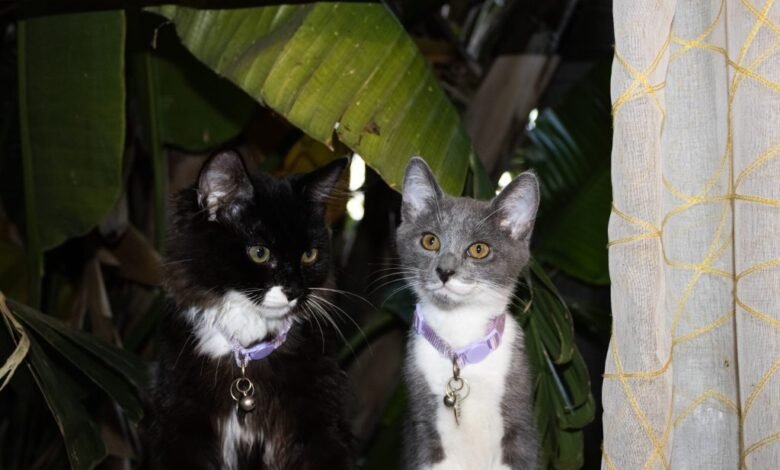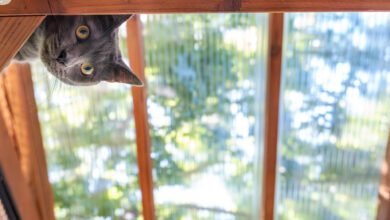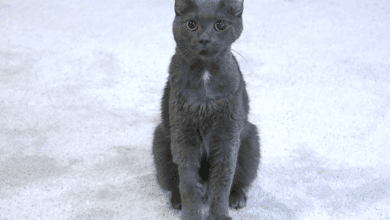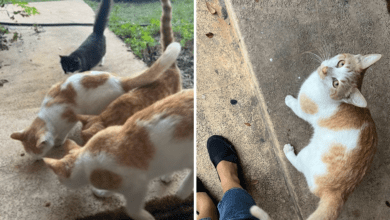Column: A Tale of Two Kittens


I’m happy to report that I’ve brought in a bumper crop this kitten season. The cat distribution system has brought me not just one, but two strange little guys to call my own.
Kitten season refers to the time of year when cats have their kittens, when it’s warm enough outside for them to survive. Because of Southern California’s idyllic climate, the region has a particularly long kitten season, which runs from spring through fall. Each year, around 180 million new kittens are born nationwide, according to a 2022 paper published in Frontiers in Veterinary Science. And they always far outnumber the loving homes available for them.
Last September, I saw a post on Long Beach Animal Care Services’ Instagram page asking for people to volunteer to foster bottle kittens (newborn kittens that need to be bottle-fed). I had lost one of my beloved cats to cancer the year before, and I felt ready to open my home and my heart to a new kitten.
I filled out an online application for a bottle kitten and indicated that I was interested in fostering. Months went by and I almost forgot about my application, but in May I got a call out of the blue asking if I could pick up a bottle kitten that same day.
Brace yourself for some sad news, dear reader: I never got to meet that kitten, or the next kitten I was contacted about. They didn’t survive. The first kitten had “fainting kitten syndrome” and began to deteriorate suddenly and rapidly, and the shelter’s adoption coordinator told me to wait to pick him up. The next kitten I was contacted about seemed fine at first, but was again told not to go to the shelter at the last minute. The second kitten apparently had fatal neurological damage that went unnoticed when he was first brought in.
But less than a week after that first call, they sent me a picture of the tiniest tuxedo kitten I’d ever seen, along with a message asking if I could pick him up from the shelter the next day. I crossed my fingers and hoped the powers that be would keep him in the land of the living until I could get to him.

I’m happy to report that my hopes were not in vain. Upon arrival at the shelter, I was escorted into a small, warm, windowless room where one wall was lined with kitten incubators and filled with tiny orphans in glass cases. While the other neonatal kittens had littermates, my tuxedo boy was alone inside his incubator. He had been surrendered alone.
Despite the grim circumstances before, my little one was a fighter. He crawled around the incubator on wobbly legs, meowing louder than all the other kittens combined.
The shelter’s lovely and hard-working adoption coordinator walked me through the basics of kitten bottle care. She taught me how to prepare the kitten’s formula and bottle, how to feed the kitten, how to keep the kitten warm, and how to help the kitten go to the bathroom—one of the many skills he hadn’t yet learned.
The shelter sent the kitten and me home with two containers of powdered kitten formula, a kitten-sized bottle, a blanket, a carrier, and an electric heating pad.
But soon after bringing him home, we hit a roadblock: he wouldn’t poop no matter how hard I tried to help him, which is something new kittens should do every 24 hours.
Anyone who has ever tried to look up a minor health issue online only to have WebMD nearly convince them that they are now at death’s door will understand how my stress escalated after researching constipation in kittens. I was pretty sure my little new friend was literally going to die from constipation. After the longest 36 hours of my life, which included two hot baths and countless belly rubs to get things moving, he finally pooped in my bathroom sink. I could have cried with joy.
After that, he started pooping on a regular schedule, which was a huge weight off my shoulders. But he still needed 24-hour care. Neonatal kittens need to eat every three hours, including during the night. They also can’t regulate their body temperature yet and need to be kept constantly warm. The electric heating pad the shelter gave me also automatically turned off every three hours.
I managed to make a little apartment for him under the table next to my bed, and plugged his heating pad and an electric kettle on top to heat his formula from the nearby electrical outlet. I added a wastebasket, gloves, paper towels, and hand sanitizer so I had everything I needed to care for him in a corner I could reach from the bed. This went on for about two weeks. By the time he was a month old, he didn’t need the bottle as often anymore, as he started showing interest in wet food.
Double the trouble
In late May, a friend told me that a family she knew had found a litter of kittens in their backyard, and had already found homes for all but one. My friend said they would take the last remaining kitten to the shelter if no one wanted it.
I wasn’t planning on getting another kitten, but I remembered how crowded the shelter was and how overwhelmed the dedicated staff was. I told my friend I could take him if no other foster families came forward.
But those absolute idiots inexplicably left him at the shelter. Luckily, the universe intervened on his behalf, and he ended up being abandoned at the shelter on the same day I had to take my first kitten—now and forever known as Tuna—for his scheduled vaccinations. I was able to take him home with me as another foster kitten.
When they brought me into the kitten room, which was separate from the room full of incubators for the newborns, I could have cried. I don’t want anyone to think that this is the fault of the shelter staff, because it is not at all. They are doing their best to care for the growing wave of unwanted kittens that are born each year in our city.
But Jesus Christ, it was like walking into a kitten prison. An entire wall lined with tiny, barred cells, the adorable inmates screaming for attention and freedom, fully aware that they committed no crimes to justify their current circumstances. I’ll hear them crying at night when I can’t sleep for years to come.
Unlike Tuna, I had planned to foster this new kitten temporarily. Then the foster coordinator told me that he would have to be brought back to his pen when he was old enough to be neutered so that potential adopters could meet him. There was no way I was going to send him back there.
Because Tuna was delivered alone, kept in an incubator by himself, and adopted as an only kitten, I believe he may have been under the impression that he was the only kitten in the world. So meeting his new brother, Rufus, was quite a shock for him.
Rufus, recently stolen from his siblings, immediately wanted to start playing, and Tuna took it personally. While Rufus was a full month younger and significantly smaller, Tuna spent their first day together running away from her new best friend at full speed and hissing at him as loud as she could. But he recovered in less than 24 hours, and the two became inseparable. They are currently napping in my bed together as I write this.
Tuna’s adoption is now finalized, and Rufus has his final rabies appointment at the shelter on Friday, after which he will be all mine forever.
But their many adorable, whiny pairs are still in the shelter, dear reader. Please, if you are able and have a love for pets, I am begging you to go to the shelter and free one of these little inmates, bring them home, and give them a life worth living. They need you, right now.





